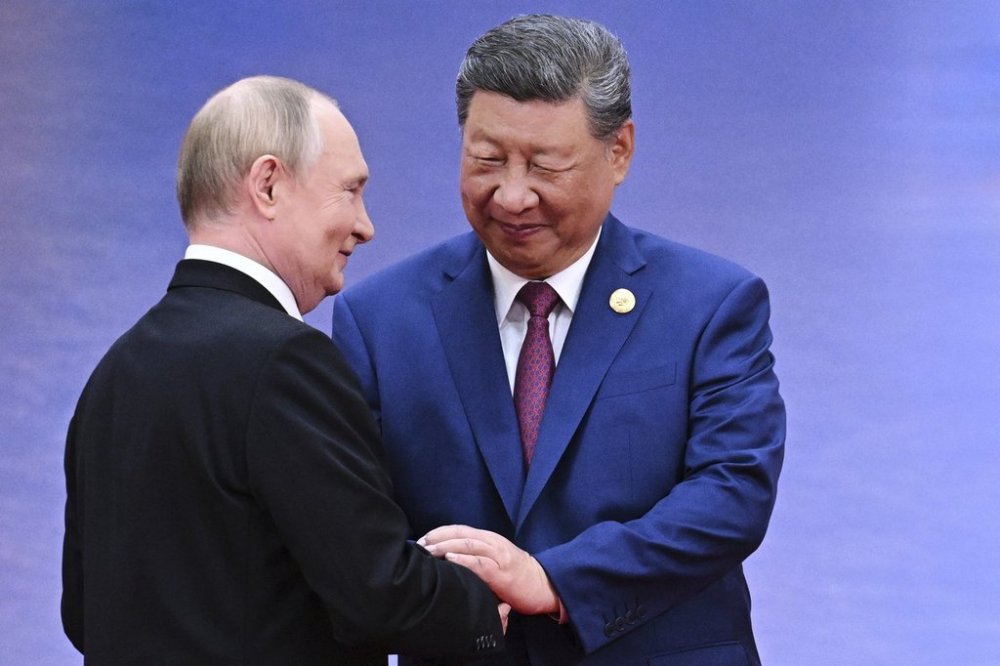World
Russia and China Forge Pipeline Agreement Amid Economic Shifts

The head of Russia’s state-owned gas company, Gazprom, announced an agreement to construct a pipeline to China, but significant uncertainties remain regarding the particulars of this deal. This project, named Power of Siberia 2, aims to compensate for the revenue losses Russia has faced due to a decrease in natural gas exports to Europe following its invasion of Ukraine.
The pipeline is designed to transport gas from western Siberian reserves through Mongolia to China. The announcement was made during a meeting between Russian President Vladimir Putin and Chinese President Xi Jinping, highlighting the strengthening ties between the two nations amidst growing tensions with the United States. While the memorandum is described as “legally binding,” key details such as gas pricing and the financing of construction are still unclear.
The proposed pipeline will extend approximately 6,700 kilometers (4,163 miles) from the Yamal Peninsula in western Siberia, traversing Lake Baikal and entering China through Mongolia. For over five decades, Russia enjoyed substantial profits by exporting gas to Europe via established pipelines. However, in response to the ongoing conflict in Ukraine, Russia has significantly reduced its gas supplies to Europe, and the European Union plans to halt remaining shipments by 2027.
The Power of Siberia 2 pipeline aims to carry up to 50 billion cubic meters of gas annually to China. In contrast, Russia previously supplied Europe with up to 180 billion cubic meters per year. As a result, the new pipeline cannot entirely replace the lost revenue from European sales. It is intended to complement an existing pipeline, the smaller Power of Siberia, which currently transports gas from eastern Siberia and has a capacity of 38 billion cubic meters annually.
Despite the optimism surrounding the announcement, analysts have noted that it primarily serves to reinforce the bilateral relationship between Russia and China, while also indicating China’s preference for alternative energy sources, including U.S. liquefied natural gas (LNG). The ongoing trade disputes between the U.S. and China, including tariffs on LNG, have further complicated the dynamics of energy supply in the region.
Analysts like Michal Meidan, head of China energy research at the Oxford Institute for Energy Studies, emphasized the need for caution. She noted that the announcement did not establish a timeline or pricing agreements, leaving significant questions regarding the future of the pipeline. The negotiations have been slow, largely due to China’s demand for low prices.
Current discussions suggest that China may only be willing to commit to a portion of the pipeline at discounted rates. This has led to a perception that Russia is effectively subsidizing China’s gas consumption. Annette Bohr, an associate fellow at Chatham House, remarked that while the agreement is a step forward for Gazprom, there are still numerous uncertainties that need to be addressed.
The implications of this agreement extend beyond mere economics. The dynamics of the partnership illustrate that China holds considerable leverage in energy negotiations. According to Alexander Gabuev, director of the Carnegie Russia Eurasia Center, China possesses multiple avenues for gas imports, and any agreement hinges on Russia meeting China’s requirements.
Amidst global efforts to reduce carbon emissions, the necessity for additional gas supplies from Russia is questionable. Meidan pointed out that the actual demand for gas in China remains uncertain, particularly as the country transitions away from coal. “Gas is sort of a nice to have but not a must-have,” she stated, highlighting the complexities of China’s future energy needs.
As this situation unfolds, it is clear that the relationship between Russia and China is evolving, with energy deals serving as a focal point of their collaboration. The Power of Siberia 2 project represents a significant shift in energy dynamics, yet it remains to be seen how effective it will be in compensating for the revenue losses incurred from reduced exports to Europe.
-

 Science2 months ago
Science2 months agoToyoake City Proposes Daily Two-Hour Smartphone Use Limit
-

 Health2 months ago
Health2 months agoB.C. Review Reveals Urgent Need for Rare-Disease Drug Reforms
-

 Top Stories2 months ago
Top Stories2 months agoPedestrian Fatally Injured in Esquimalt Collision on August 14
-

 Technology2 months ago
Technology2 months agoDark Adventure Game “Bye Sweet Carole” Set for October Release
-

 World2 months ago
World2 months agoJimmy Lai’s Defense Challenges Charges Under National Security Law
-

 Technology2 months ago
Technology2 months agoKonami Revives Iconic Metal Gear Solid Delta Ahead of Release
-

 Technology2 months ago
Technology2 months agoSnapmaker U1 Color 3D Printer Redefines Speed and Sustainability
-

 Technology2 months ago
Technology2 months agoAION Folding Knife: Redefining EDC Design with Premium Materials
-

 Business2 months ago
Business2 months agoGordon Murray Automotive Unveils S1 LM and Le Mans GTR at Monterey
-

 Technology2 months ago
Technology2 months agoSolve Today’s Wordle Challenge: Hints and Answer for August 19
-

 Lifestyle2 months ago
Lifestyle2 months agoVictoria’s Pop-Up Shop Shines Light on B.C.’s Wolf Cull
-

 Technology2 months ago
Technology2 months agoApple Expands Self-Service Repair Program to Canada









